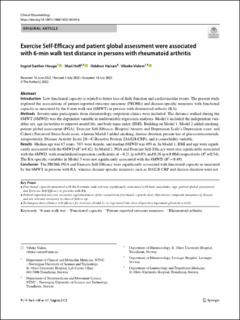| dc.contributor.author | Houge, Ingrid Sæther | |
| dc.contributor.author | Hoff, Mari | |
| dc.contributor.author | Halsan, Oddrun | |
| dc.contributor.author | Videm, Vibeke | |
| dc.date.accessioned | 2023-01-06T13:12:18Z | |
| dc.date.available | 2023-01-06T13:12:18Z | |
| dc.date.created | 2022-08-09T09:14:03Z | |
| dc.date.issued | 2022 | |
| dc.identifier.issn | 0770-3198 | |
| dc.identifier.uri | https://hdl.handle.net/11250/3041618 | |
| dc.description.abstract | Introduction: Low functional capacity is related to future loss of daily function and cardiovascular events. The present study explored the associations of patient-reported outcome measures (PROMs) and disease-specific measures with functional capacity as measured by the 6-min walk test (6MWT) in persons with rheumatoid arthritis (RA). Methods: Seventy-nine participants from rheumatology outpatient clinics were included. The distance walked during the 6MWT (6MWD) was the dependent variable in multivariable regression analyses. Model 1 included the independent variables sex, age (in tertiles to improve model fit), and body mass index (BMI). Building on Model 1, Model 2 added smoking, patient global assessment (PGA), Exercise Self-Efficacy, Hospital Anxiety and Depression Scale’s Depression score, and Cohen’s Perceived Stress Scale score, whereas Model 3 added smoking, disease duration, present use of glucocorticosteroids, seropositivity, Disease Activity Score 28—C-Reactive Protein (DAS28-CRP), and a comorbidity variable. Results: Median age was 65 years, 76% were female, and median 6MWD was 493 m. In Model 1, BMI and age were significantly associated with the 6MWD (R2 = 0.42). In Model 2, PGA and Exercise Self-Efficacy were also significantly associated with the 6MWD, with standardized regression coefficients of − 0.21 (p = 0.03) and 0.26 (p = 0.004) respectively (R2 = 0.54). The RA-specific variables in Model 3 were not significantly associated with the 6MWD (R2 = 0.49). Conclusion: The PROMs PGA and Exercise Self-Efficacy were significantly associated with functional capacity as measured by the 6MWT in persons with RA, whereas disease-specific measures such as DAS28-CRP and disease duration were not. | en_US |
| dc.description.abstract | Exercise Self-Efficacy and patient global assessment were associated with 6-min walk test distance in persons with rheumatoid arthritis | en_US |
| dc.language.iso | eng | en_US |
| dc.publisher | Springer Nature | en_US |
| dc.relation.uri | https://link.springer.com/article/10.1007/s10067-022-06309-6 | |
| dc.rights | Navngivelse 4.0 Internasjonal | * |
| dc.rights.uri | http://creativecommons.org/licenses/by/4.0/deed.no | * |
| dc.title | Exercise Self-Efficacy and patient global assessment were associated with 6-min walk test distance in persons with rheumatoid arthritis | en_US |
| dc.title.alternative | Exercise Self-Efficacy and patient global assessment were associated with 6-min walk test distance in persons with rheumatoid arthritis | en_US |
| dc.type | Peer reviewed | en_US |
| dc.type | Journal article | en_US |
| dc.description.version | publishedVersion | en_US |
| dc.source.pagenumber | 3687–3696 | en_US |
| dc.source.volume | 41 | en_US |
| dc.source.journal | Clinical Rheumatology | en_US |
| dc.identifier.doi | https://doi.org/10.1007/s10067-022-06309-6 | |
| dc.identifier.cristin | 2041868 | |
| dc.relation.project | Norges teknisk-naturvitenskapelige universitet: Project number: 82600805 | en_US |
| cristin.ispublished | true | |
| cristin.fulltext | original | |
| cristin.qualitycode | 1 | |

